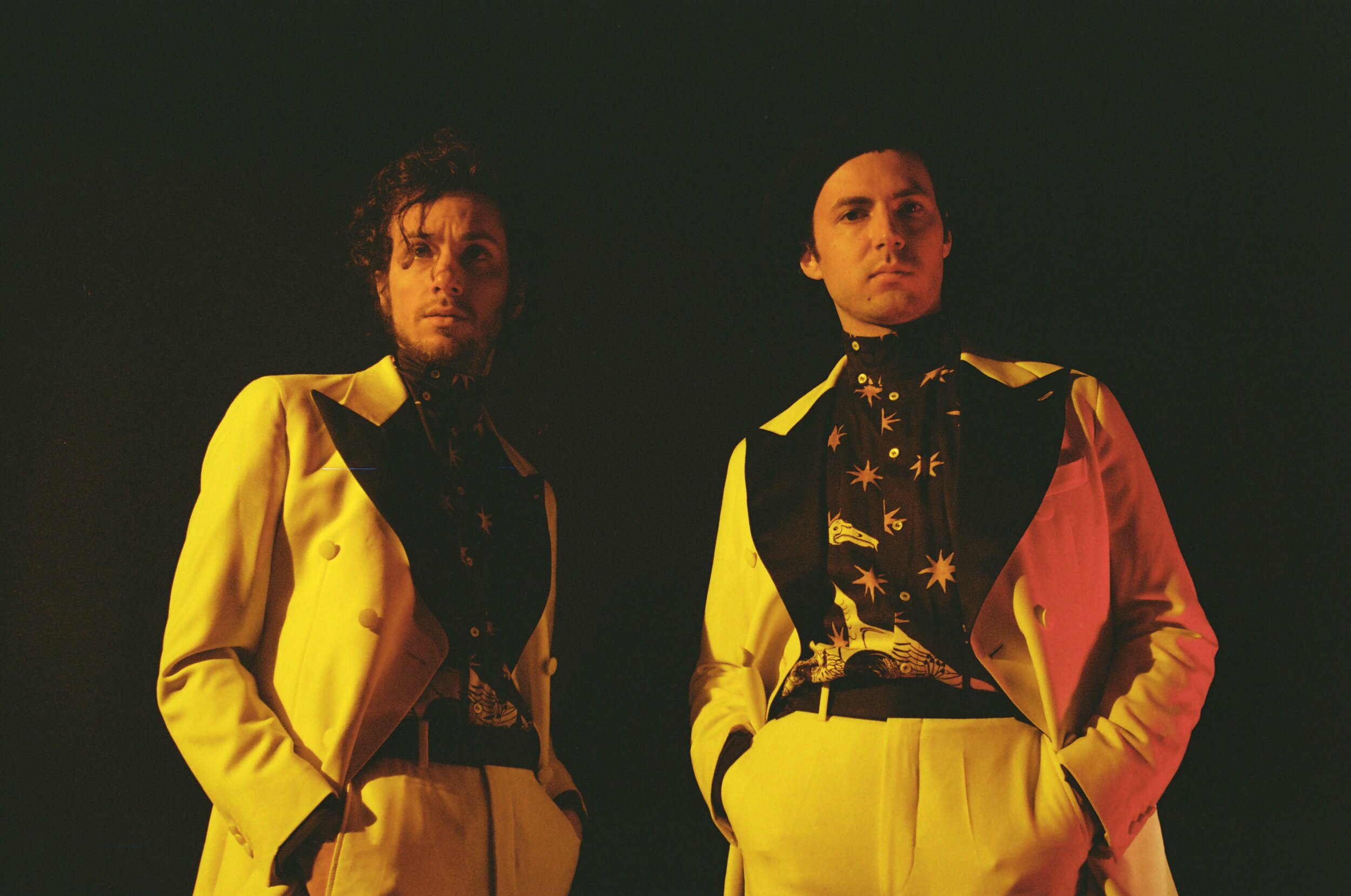As the Hedi Slimane-approved duo prepare to release their third album Paradigmes, Marlon Magnée and Sacha Got discuss their sound, their new music and their love of creating videos
There’s a phrase echoing around the digital ether ahead of La Femme’s third album, Paradigmes: ‘paradigmes fade and masks fall.’ The paradigm of their own creation is strange and irrefutable.
Marlon Magnée and Sacha Got are the French act who have a recent single, Le Jardin, in Spanish; English subtitles on their video Cool Colorado (‘life is calm / angels caress me’); a previous lyric in Arabic and a YouTube channel full of fan words from Mexico, Turkey, Japan, Russia, Ukraine, the US … In the way that everyone habitually watches foreign language cinema or TV dramas now, La Femme achieved post-language status through their music across the 2010s, all with cinematic reverb. Their visceral imagination doesn’t just win listeners over, it leads them hand-in-hand to beguiling places.
Yet, versed as they are in crazy rhythm changes, unorthodox arrangements and instrumentation, La Femme couldn’t be anything other than French, taking in elements of chanson, cabaret, 80s cold wave and yé-yé. This band turns chaos into a soufflé.
“It’s one of my duties to surprise people and push things as far as we can, because it’s not every day you can do that,” Magnée offers of their sound sans frontières over a Zoom call from Paris. “It’s so fucking good because I can really connect with the planet. We are all together, brothers and sisters. But we have so much more work to do: it’s just the beginning. We want to write in all the languages of the world. It’s just that our speciality is to write in French.”
Over the past six months, La Femme have been uploading single after single to streaming platforms, each song not just a different flavour but its own freak genre. You’d think they would have culminated in Disconnexion, a pummelling disco track colliding with the vocal performance of a Michel Foucault double. But there’s been three more since and the only way is up.
“The idea of a very good disco instrumental and very boring disco talk,” beams Magnée of the track. “We love to talk about the world and life and philosophy, but we never say that we are specialists, or we never try to be intellectual. It’s more like at 2am when you’re drunk with your friend. And we always wanted to make fun of all these TV shows, when you have, like, the specialist talking forever. When you ask him something simple, they never answer, they always sneak out of the question – like a politician.”
Much as La Femme’s music is seasoned with deep references to the greats of the 20th century from Gainsbourg to The Velvet Underground (Tatiana evoking the distorted viola of John Cale), as well as those cult and overlooked, it’s also in the reading of their own history that their highly crafted body of work shines. La Sang de Mon Prochain is a sibling to Hyposoline from their 2013 debut LP Psycho Tropical Berlin. They are not fucking around.
“The way we’ve released the new music is in reaction to society,” Marlon continues. “Nowadays people don’t really listen to a record; they skip playlists and stuff. We were like, ‘OK, fuck it, you don’t want to listen to a record straight! We’ll find a new strategy and be more like the rap game.’ Though even since the beginning we’ve always thought like a rap artist: we keep the publishing, we keep the production.”
Surprise! La Femme do sell physicals. (Their previous albums are gold status in France). At the time of writing, the pre-order of their first pressing of Paradigmes has nearly gone. When the needle hits the record – a double LP because they are connoisseurs – listeners will find all the microdoses become a stunning sequence. It’s a work-of-art, fitting together with prodigal flair.
Established in Biarritz, 2010, as a core duo, Magnée and Got are joined on stage by the rhythm section of Sam Lefevre (bass) and Noé Delmas (drums). While the project is an open book of female vocal talent: Alma Jodorowsky, Clara Luciani, Clémence Quélennec, Grace Hartzel and Jane Peynot, showcasing their predilection for a pure 60s voice that stands broader as a tribute to woman – even if, as Magnée says, their reason for calling themselves La Femme is “a mystery.”
“We wanted to go to art school,” Marlon explains of their love of creating videos and the importance of how they present themselves visually. “The art schools in Paris never accepted us, so we started our own school with La Femme: we always had a strong idea of what we wanted ... When I was a kid, I was more in the punk scene, rockabilly and they take care with their clothes, you know?
“Even with skinheads, everything had to be a certain way, your flight jacket and everything – which is funny because they’re all very tough. A bit like mod style, I started to have the culture of clothing, ‘make sure your shoes are in this way, your trousers …’ Now I really like the 19th century, and I go back and back. I train my aesthetic eyes all the time.”
It’s clear to see why they enjoy friendship with Hedi Slimane, and have soundtracked two of his shows, Autumn/Winter 2015 Saint Laurent and Spring/Summer 2019 Celine.
An early memory Marlon has of Sacha is seeing him, aged 11, playing Jimi Hendrix tunes on the beach at a Biarritz surf contest. (The small town they hail from, just shy of 20 miles from the Spanish border, is renowned as the birthplace of surf in Europe.)
“I was impressed,” Magnée remembers. “Sacha was playing the guitar under his head, with his teeth.”
SACHA GOT, MARLON MAGNÉE
LA FEMME: PARADIGMES
TEXT DEAN MAYO DAVIES
PHOTOGRAPHY ORIANE ROBALDO
ANOTHERMAG.COM, MARCH 2021

